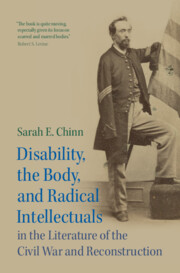Book contents
- Disability, the Body, and Radical Intellectuals in the Literature of the Civil War and Reconstruction
- Cambridge Studies in American Literature and Culture
- Disability, the Body, and Radical Intellectuals in the Literature of the Civil War and Reconstruction
- Copyright page
- Dedication
- Contents
- Figures
- Acknowledgments
- Introduction
- Chapter 1 Giving Up the Ghost
- Chapter 2 “Strewn promiscuously about”
- Chapter 3 1860 or 1865? Amending the National Body
- Chapter 4 “I don’t care a rag for ‘the Union as it was’”
- Chapter 5 Shaking Hands
- Conclusion
- Notes
- Bibliography
- Index
- Recent books in this series (continued from page ii)
Chapter 2 - “Strewn promiscuously about”
Limbs and What Happens to Them
Published online by Cambridge University Press: 13 June 2024
- Disability, the Body, and Radical Intellectuals in the Literature of the Civil War and Reconstruction
- Cambridge Studies in American Literature and Culture
- Disability, the Body, and Radical Intellectuals in the Literature of the Civil War and Reconstruction
- Copyright page
- Dedication
- Contents
- Figures
- Acknowledgments
- Introduction
- Chapter 1 Giving Up the Ghost
- Chapter 2 “Strewn promiscuously about”
- Chapter 3 1860 or 1865? Amending the National Body
- Chapter 4 “I don’t care a rag for ‘the Union as it was’”
- Chapter 5 Shaking Hands
- Conclusion
- Notes
- Bibliography
- Index
- Recent books in this series (continued from page ii)
Summary
Chapter 2 explores accounts by Civil War nurses and surgeons – first-person nonfiction, lightly fictionalized narrative, sensationalized memoir, and fiction. The central texts in this chapter are Walt Whitman’s Memoranda after the War, Louisa May Alcott’s Hospital Sketches, John Brinton’s Personal Memoirs, Susie King Taylor’s Reminiscences of My Life in Camp, and S. Weir Mitchell’s “The Case of George Dedlow.” These narrators represent amputation in different ways, especially the scene of amputation itself, the image of a basket or trough of dismembered limbs, and amputee reflections on the relationship between their remaining bodies and their absent limbs. However, for all the narrators in these texts, amputation is part of a meditation on the meanings of intact and amputated bodies, and their role in making sense of the Civil War. The chapter ends with a discussion of the Army Medical Museum, in which amputated limbs were catalogued, stored, and displayed as examples of the damage done by gunshots and shells. This dovetails with a reading of George Dedlow, in which the protagonist’s legs, stored in alcohol at the Museum, return to him briefly during a séance, absurdly marrying hopes for bodily resurrection with spiritualism’s belief in a humanized heaven.
Keywords
- Type
- Chapter
- Information
- Disability, the Body, and Radical Intellectuals in the Literature of the Civil War and Reconstruction , pp. 71 - 102Publisher: Cambridge University PressPrint publication year: 2024

